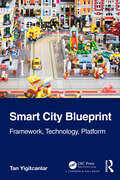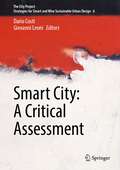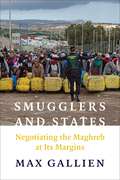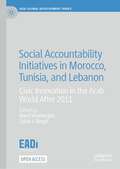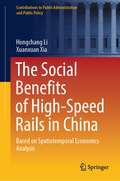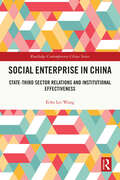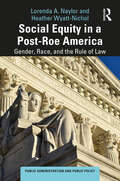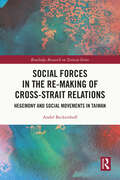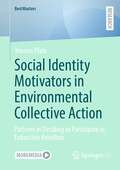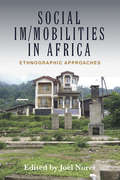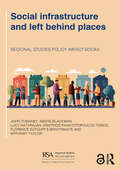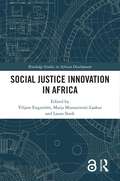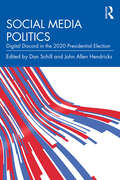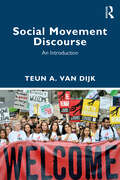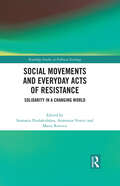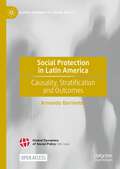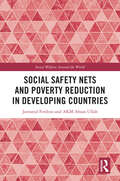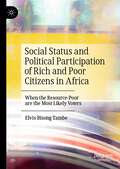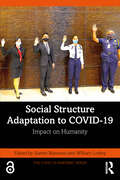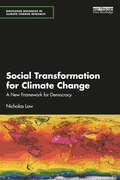- Table View
- List View
Smart Cities in Poland: Towards sustainability and a better quality of life?
by Izabela Jonek-Kowalska Radosław WolniakThis book considers and examines the concept of a Smart City in the context of improving the quality of life and sustainable development in Central and Eastern European cities. The Smart City concept has been gaining popularity in recent years, with supporters considering it to be an effective tool to improve the quality of life of the city’s residents. In turn, opponents argue that it is a source of imbalance and claim that it escalates the problems of social and economic exclusion. This book, therefore, assesses the quality of life and its unsustainability in Central and Eastern European cities within the context of the Smart City concept and from the perspective of key areas of sustainable development. Using case studies of selected cities in Central and Eastern Europe and representative surveysof Polish cities, this book illustrates the process of creating smart cities and their impact on improving the quality of life of citizens. Specifically, this book investigates the conditions that a Smart City has to meet to become sustainable, how the Smart City concept can support the improvement of the residents’ quality of life and how Central and Eastern European countries create smartcity solutions. Containing both theoretical and practical content, this book will be of relevance to researchers and students interested in smart cities and urban planning, as well as city authorities and city stakeholders who are planning to implement the Smart City concept.
Smart City Blueprint: Framework, Technology, Platform
by Tan YigitcanlarThe smart city movement, during the last decade and a half, advocated the built environment and digital technology convergence with the backing of institutional capital and government support. The commitment of a significant number of local governments across the globe, in terms of official smart city policies and initiatives, along with the constant push of global technology giants, has reinforced the popularity of this movement. This two-volume treatment on smart cities thoroughly explores and sheds light on the prominent elements of the smart city phenomenon and generates a smart city blueprint. This first volume, with its 12 chapters, provides a sound understanding on the key foundations and growth directions of smart city frameworks, technologies, and platforms, with theoretical expansions, practical implications, and real-world case study lessons. The second companion volume offers sophisticated perspectives on the key foundations and directions of smart city policies, communities, and urban futures, with theoretical expansions, practical implications, and real-world case study lessons. This book is an invaluable reference source for urban policymakers, managers, planners, practitioners, and many others, particularly to benefit from it when tackling key urban and societal issues and planning for and delivering smart city solutions. Moreover, the book is also a rich and important repository for scholars and research and undergraduate students as it communicates the complex smart city phenomenon in an easy to digest form, by providing both the big picture view and specifics of each component of that view. It also appeals to local government agencies and smart city practitioners.
Smart City: A Critical Assessment (The City Project #6)
by Dario Costi Giovanni LeoniThis contributed volume reports on a multidisciplinary collective work on the topic of Smart City, merging scientific reflections and operational issues. Here, current Smart Cities concepts are subjected to criticism, while the related terminology has been updated to contemplate a model of urban development capable of integrating technical and humanistic culture by fostering an open dialogue between different stakeholders. Upon an introduction to the state of the art, this book presents a glossary of definitions and concepts around the contemporary city, and five interviews with researchers and scholars of different background. The last chapter summarizes current challenges in designing the city of the future, highlighting new research directions in home-infrastructure, small smart city, energy transition, connectivity, digitalization and autonomous and connected mobility.Written by the members of the Scientific Committee of the Smart City 4.0 Sustainable LAB ResearchLaboratory, an inter-university network including research groups from the University of Parma, University of Modena and Reggio Emilia, University of Bologna, University of Ferrara, the Polytechnic University of Milan, and the Catholic University of Milan with its Piacenza campus, this book offers a source of inspiration for other researchers and stakeholders, and it is intended to foster collaborations between different stakeholders - and possibly countries – to develop future cities that are wise, green, sustainable and inclusive.
Smugglers and States: Negotiating the Maghreb at Its Margins (Columbia Studies in Middle East Politics)
by Max GallienSmuggling is typically thought of as furtive and hidden, taking place under the radar and beyond the reach of the state. But in many cases, governments tacitly permit illicit cross-border commerce, or even devise informal arrangements to regulate it. Drawing on extensive fieldwork in the borderlands of Tunisia and Morocco, Max Gallien explains why states have long tolerated illegal trade across their borders and develops new ways to understand the political economy of smuggling.This book examines the rules and agreements that govern smuggling in North Africa, tracing the involvement of states in these practices and their consequences for borderland communities. Gallien demonstrates that, contrary to common assumptions about the effects of informal economies, smuggling can promote both state and social stability. States not only turn a blind eye to smuggling, they rely on it to secure political acquiescence and maintain order, because it provides income for otherwise neglected border communities. More recently, however, the securitization of borders, wars, political change, and the pandemic have put these arrangements under pressure. Gallien explores the renegotiation of the role of smuggling, showing how stability turns into vulnerability and why some groups have been able to thrive while others have been pushed further to the margins. With both rich empirical detail and novel theoretical contributions, Smugglers and States offers important insights into security and stability in North Africa and the prospects for economic inclusion in a context where many livelihoods exist outside of the law.
Snow White's Forest Friends (Step into Reading)
by Nicholas TanaDiscover how Princess Snow White from Disney Snow White and the Seven Dwarfs met her animal friends in this Step 2 Step into Reading levelled reader! Perfect for beginning readers ages 4 to 6.One sunny spring morning, Princess Snow White wakes up to find a bunny stuck in the bottom of her wishing well. With some quick thinking and the help of the other animals in the forest, can Snow White rescue the bunny? Young readers and Disney Princess fans will love this sweet story about helping others and new friends.Step 2 readers use basic vocabulary and short sentences to tell simple stories. For children who recognize familiar words and can sound out new words with help.
Social Accountability Initiatives in Morocco, Tunisia, and Lebanon: Civic Innovation in the Arab World After 2011 (EADI Global Development Series)
by Ward Vloeberghs Sylvia I. BerghThis Open Access Pivot represents the first extensive exploration of social accountability within the Arab world following the 2011 Arab uprisings. Drawing on insights from development studies, comparative politics, and Middle East studies, the authors explore the evolution of accountability as a governance concept, review theories on social accountability’s role in improving public service delivery, and categorize types of social accountability initiatives, highlighting respective strengths and weaknesses. Detailed country chapters provide a solid basis for the comparative approach which reveals major variations in meanings of accountability, mobilization strategies, and official responses, rooted in the specific sociopolitical contexts of each country. Moreover, the book analyzes the influence of political and economic elites as well as the nature of popular mobilisation on accountability dynamics in the region. The authors conclude by discerning differences and commonalities across cases and offer recommendations for policymakers, donors, and practitioners seeking to enhance the effectiveness of social accountability initiatives. They address challenges such as the lack of enforcement mechanisms, the difficulty of scaling up initiatives, and the ambiguous effects of international interventions. This pioneering Pivot fills a significant void in the study of social accountability in the MENA region and provides a compelling framework for future research and policy design, making it an indispensable resource for experts and scholars.
The Social Benefits of High-Speed Rails in China: Based on Spatiotemporal Economics Analysis (Contributions to Public Administration and Public Policy)
by Hongchang Li Xuanxuan XiaThis book summarizes the quantitative research methods related to the social benefits of high-speed rails. It also explores the political, economic, technological, social and environmental impacts of high-speed rails. As China's new national business card, high-speed railways not only reflect the advanced technology of Chinese railways but also reflect China's increasing comprehensive national power. The highlight of the book is to conduct multidimensional analysis of the social benefits of the high-speed rail with a focus of spatiotemporal economics analysis.
Social Enterprise in China: State-Third Sector Relations and Institutional Effectiveness (Routledge Contemporary China Series)
by Echo Lei WangWang offers an empirically based exploration into work-integration social enterprises as a means for delivering social services in China. Focusing on the political economy of social enterprise development in China, Wang examines the nature of the relationship between the state and social enterprises and the implications of such relationships for their institutional effectiveness. She adopts a bottom-up approach that investigates indigenous practices embedded within the local political context. Common ground has been established internationally that the social enterprise model provides new ways of social service delivery that could potentially change and restructure the social welfare economy. However, the development path differs across social contexts, especially in an authoritarian country like China. This study provides insights into China's efforts to develop its social welfare sector and reinvigorate customary ideas about how public services could be better offered given the country's political economy. This book will be of great interest to both scholars of China’s political economy and those with an interest in the development of the social enterprise sector looking to see how this works in a Chinese context.
Social Equity in a Post-Roe America: Gender, Race, and the Rule of Law (Public Administration and Public Policy)
by Lorenda A. Naylor Heather Wyatt-NicholDespite hundreds of federal laws and U.S. Supreme Court decisions prohibiting discrimination based on sex and race, American women and people of color continue to face pervasive individual and structural discrimination. Women often lack equal pay for equal work, affordable childcare, and paid family medical leave. Following the overturning of Roe vs. Wade, safe, legal abortion has become inaccessible in approximately half the country, disproportionately impacting poor women. Women and people of color are underrepresented in elected offices at the federal and state levels, and the voting rights of people of color continue to be eroded. Employing a public administration framework, Social Equity in a Post-Roe America documents the scope and breadth of inequality in the United States, linking social equity to sex, race, and the rule of law.This insightful and provocative new book examines U.S. Supreme Court decisions and federal statutes across four public policy domains that increasingly influence U.S. democracy and impact the lives of American women. These policy domains consist of political representation, which includes citizenship and voting rights, contraception, abortion, and employment. Social Equity in a Post-Roe America offers policy recommendations to increase equitable access and equal opportunity for women and people of color. It is required reading for all students of public administration, public policy, and political science, as well as for engaged citizens.
Social Forces in the Re-Making of Cross-Strait Relations: Hegemony and Social Movements in Taiwan (Routledge Research on Taiwan Series)
by André BeckershoffAdopting a critical political economy perspective this book sheds new light on the social and political struggles that shaped the political dynamics of Taiwan-China relations and cross-Strait rapprochement between 2008 and 2014. Presenting a careful analysis of primary sources and interviews, the book reconstructs the historical, political and socio-economic factors that shaped Taiwan’s path to the Sunflower Movement of 2014, reinterpreting this process as a struggle over Taiwan’s role in the global economy. It challenges received wisdoms regarding the rise and fall of the rapprochement: First, the study argues that the rapprochement was not primarily driven by political elites but by capitalist conglomerates within Taiwan, which sought a normalisation of economic relations across the Taiwan Strait. Second, it finds that Taiwan’s social movements during that period were not homogeneous but rather struggled to find a common vision that could unite the critics of the rapprochement. The insights provided not only offer a deeper understanding of Taiwan’s protest cycle between 2008 and 2014, but also serve to recontextualise the political dynamics in post-Sunflower Taiwan. As such it will appeal to students and scholars of Taiwan Studies, East Asian Politics and Social Movement Studies.
Social Identity Motivators in Environmental Collective Action: Patterns in Deciding to Participate in Extinction Rebellion (BestMasters)
by Yvonne PlateSocial Identity research has found prominence in the realm of collective action but lacks an environmental activism focus. This study gathers individuals’ experiences to explore the influences on decision-making processes to join an environmental activist group – the local Extinction Rebellion (XR) group in Stuttgart, Germany. This case study is used to identify patterns in this process, to test the applicability of existing models and to explore the significance of social identity. Activists and past activists were interviewed. The results make it apparent that the existing models are not sufficient to represent social identity processes in environmental activism. The findings are visualized in a suggested adjusted model of collective action, which suggests norms and morals and (politicized) social identity as a twin core influencing collective action. Social identity retains its significance at the center of the model. Furthermore, it is suggested that collective efficacy beliefs and a sense of agency are interchangeable factors influencing the twin core and collective action directly. Injustice perceptions remain essential. Social connections, group identification, group dynamics, participatory efficacy, self-identity, and image are found to play a role occasionally but require further investigation. The convergence of collective efficacy beliefs and a sense of agency and the valuation of factors present especially relevant future research topics.
Social Im/mobilities in Africa: Ethnographic Approaches
by Joël NoretGrounded in both theory and ethnography, this volume insists on taking social positionality seriously when accounting for Africa’s current age of polarizing wealth. To this end, the book advocates a multidimensional view of African societies, in which social positions consist of a variety of intersecting social powers - or ‘capitals’ – including wealth, education, social relationships, religion, ethnicity, and others. Accordingly, the notion of social im/mobilities emphasizes the complexities of current changes, taking us beyond the prism of a one-dimensional social ladder, for social moves cannot always be apprehended through the binaries of ‘gains’ and ‘losses’.
Social infrastructure and left behind places (Regional Studies Policy Impact Books)
by John Tomaney Maeve Blackman Lucy Natarajan Dimitrios Panayotopoulos-Tsiros Florence Sutcliffe-Braithwaite Myfanwy TaylorThis book explores the making, unmaking and remaking of social infrastructure in ‘left-behind places’. Such places, typically once flourishing industrial communities that have been excluded from recent economic growth, now attract academic and policy attention as sites of a political backlash against globalisation and liberal democracy. The book focuses on the role of social infrastructure as a key component of this story. Seeking to move beyond a narrowly economistic of reading ‘left behind places’, the book addresses the understudied affective dimensions of ‘left-behindness’. It develops an analytical framework that emphasises the importance of place attachments and the consequences of their disruption; considers ‘left behind places’ as ‘moral communities’ and the making of social infrastructure as an expression of this; views the unmaking of social infrastructure through the lens of ‘root shock’; and explains efforts at remaking it in terms of the articulation of ‘radical hope’. The analysis builds upon a case study of a former mining community in County Durham, North East England. Using mixed methods, it offers a ‘deep place study’ of a single village to understand more fully the making, unmaking and remaking of social infrastructure. It shows how a place once richly endowed with social infrastructure, saw this endowment wither and the effects this had on the community. However, it also records efforts of the local people to rebuild social infrastructure, typically drawing the lessons of the past. Although the story of one village, the methods, results and policy recommendation have much wider applicability. The book will be of interest to researchers, policy makers and others concerned with the fate of ‘left behind places’.
Social infrastructure and left behind places (Regional Studies Policy Impact Books)
by John Tomaney Maeve Blackman Lucy Natarajan Dimitrios Panayotopoulos-Tsiros Florence Sutcliffe-Braithwaite Myfanwy TaylorThis book explores the making, unmaking and remaking of social infrastructure in ‘left-behind places’. Such places, typically once flourishing industrial communities that have been excluded from recent economic growth, now attract academic and policy attention as sites of a political backlash against globalisation and liberal democracy. The book focuses on the role of social infrastructure as a key component of this story.Seeking to move beyond a narrowly economistic of reading ‘left behind places’, the book addresses the understudied affective dimensions of ‘left-behindness’. It develops an analytical framework that emphasises the importance of place attachments and the consequences of their disruption; considers ‘left behind places’ as ‘moral communities’ and the making of social infrastructure as an expression of this; views the unmaking of social infrastructure through the lens of ‘root shock’; and explains efforts at remaking it in terms of the articulation of ‘radical hope’.The analysis builds upon a case study of a former mining community in County Durham, North East England. Using mixed methods, it offers a ‘deep place study’ of a single village to understand more fully the making, unmaking and remaking of social infrastructure. It shows how a place once richly endowed with social infrastructure, saw this endowment wither and the effects this had on the community. However, it also records efforts of the local people to rebuild social infrastructure, typically drawing the lessons of the past. Although the story of one village, the methods, results and policy recommendation have much wider applicability.The book will be of interest to researchers, policy makers and others concerned with the fate of ‘left behind places’.The Open Access version of this book, available at http://www.taylorfrancis.com, has been made available under a Creative Commons Attribution-Non Commercial (CC-BY-NC) 4.0 license.
Social Justice in Practice in Education: Understanding Tensions and Challenges Through Lived Experiences
by Janice Wearmouth Karen Lindley Uvanney Maylor James SheaExploring Social Justice in Practice in Education focuses on the tensions and challenges to issues of fairness and social and cognitive justice in the sphere of education. The terms ‘fairness’ and ‘social and cognitive justice’ are often used to justify particular policies and practices in the sphere of education. In providing a clear definition of what they should mean in practice, this book includes a discussion of, and, in some cases, potential resolutions to, tensions and challenges in relation to notions of fairness, and social and cognitive justice that are implicit within individuals’ lived experiences across all phases of education. Through their personal narratives, the authors illustrate how such tensions and challenges have played out in their own lives. They go on to explore differences in interpretations and consequent challenges in putting concepts of social justice into practice. Chapters consider important implications across different sectors and phases of education, including special educational needs, leadership and higher education. This insightful volume will enable educators, at all levels, to hear from students, family members, significant adults/carers and professionals, their experiences of fairness and social justice in education, and about what could be done in the future to redress injustices. It will appeal to readers at all levels in education including those studying for or teaching Education-related degrees at bachelors’, masters’ and doctoral levels.
Social Justice Innovation in Africa (Routledge Studies in African Development)
by Laura Stark Maija Mustaniemi-Laakso Viljam EngströmAdopting a multidisciplinary approach, this book discusses the potential of social innovation in the pursuit of social justice in Africa. In the twenty-first century, social innovation and entrepreneurship have attracted renewed attention as a way of promoting social justice and addressing challenges of poverty and inequality.Drawing on perspectives from human rights, economics, business, development studies and anthropology, this book illustrates the entangled relationship between societal areas and activities, as well as different actors (individuals, communities, business actors, non-governmental organisations and public authorities) in social innovation. It identifies various models of social innovation, ranging from grassroots initiatives to public policymaking, and discusses their impact on socioeconomic welfare. It analyses a broad range of original research data and incorporates localised understandings of social innovation, highlighting both the empowering potential of social innovation and the possibility that it could sustain or create inequalities. As such, this book deepens an understanding of what makes social innovation ‘social’ and ‘just’.Arguing that social justice innovation can only be understood in context, this book will be of interest for researchers and policy makers across the fields of human rights, economics, business, development studies, anthropology and African studies.
Social Media Politics: Digital Discord in the 2020 Presidential Election
by Dan Schill John Allen HendricksSocial media and social networking services are integrated into the American political process and have profoundly influenced political communication and participation. Social media platforms have transformed the political landscape by revolutionizing information dissemination, citizen engagement, and public opinion formation and change. Politicians use social media to communicate directly with voters in an unmediated and unfiltered manner. Comparatively, voters use social media to follow the latest messaging from politicians accompanied by demonstrating their support for particular politicians. This book is a comprehensive examination of the role of digital and social media in the 2020 U.S. presidential election. Political discourse during the 2020 election revealed political disharmony and a deep political division among vast swaths of Americans that was powered, in part, by social media. This book reveals how digital and social media have reshaped power dynamics by altering the relationships among citizens, politicians, and traditional media outlets, the emergence of new influencers, and the impact of online activism on policy agendas.This book, Social Media Politics, includes scholars with varied backgrounds and experience, using both quantitative and qualitative methodologies, from leading research institutions around the nation. Students, scholars, and practitioners will gain new knowledge to more clearly understand the role social media played in the 2020 presidential campaign.
Social Movement Discourse: An Introduction
by Teun A. van DijkThis is both the first systematic introduction to Discourse Studies for students and scholars of social movements and a study of discourses on the European "refugee crisis", by leading theorist, Teun A. van Dijk. Concrete examples of different kinds of discourse are vital for the study of social movements because their activities are not limited to such well-known forms of contention as marches, occupations or strikes, but also daily discursive activities, such as meetings, assemblies, interviews, press conferences, manifestos, pamphlets, banners, graffiti, websites, blogs, social media posts and everyday talk. This book proposes that empirical analyses of these discourses should go beyond the popular but vague notion of "frame" and engage in more detailed and explicit analyses of the text and talk of social movements. This is a much-needed introduction to the most important structures of discourse and a detailed theoretical account of the notion of "solidarity" defining the Refugees Welcome movement.
Social Movement Discourse: An Introduction
by Teun A. van DijkThis is both the first systematic introduction to Discourse Studies for students and scholars of social movements and a study of discourses on the European “refugee crisis”, by leading theorist, Teun A. van Dijk.Concrete examples of different kinds of discourse are vital for the study of social movements because their activities are not limited to such well-known forms of contention as marches, occupations or strikes, but also daily discursive activities, such as meetings, assemblies, interviews, press conferences, manifestos, pamphlets, banners, graffiti, websites, blogs, social media posts and everyday talk.This book proposes that empirical analyses of these discourses should go beyond the popular but vague notion of “frame”and engage in more detailed and explicit analyses of the text and talk of social movements.This is a much-needed introduction to the most important structures of discourse and a detailed theoretical account of the notion of “solidarity” defining the Refugees Welcome movement.
Social Movements and Everyday Acts of Resistance: Solidarity in a Changing World (Routledge Studies in Political Sociology)
by Stamatis Poulakidakos Anastasia Veneti Maria RoviscoThis book focuses on small-scale mobilisation and everyday social movements that take the form of grassroots resistance and solidarity initiatives. Through a series of case studies drawn from the UK, Europe, India, and Latin America, it examines the dynamics and role of micro-acts of resistance, with attention to a range of themes including organisational issues, the construction of collective identity, strategies, tactics and participation, and media representations and public perception of small-scale social movements. As such, it will appeal to scholars and students of sociology, media and communication and politics with interests in social movements, political mobilisation and activism.
Social Protection in Latin America: Causality, Stratification and Outcomes (Global Dynamics of Social Policy)
by Armando BarrientosThis book offers a comprehensive analysis of social protection in Latin America, its origins, institutions, and outcomes. The chapters are organised in three groups. The earlier chapters discuss in turn appropriate methods, an analytical framework, and core institutions. The book advocates a causal inference approach to the study of the institutions that have dominated social protection in the region: occupational insurance, individual retirement savings, and social assistance. The middle chapters study social protection’s main stratification effects, focussing on stratification effects on employment, protection, and worker incorporation. The later chapters then assess social protection outcomes and identify country groupings including their evolution over time. The book, and its approach and findings, contributes to the advancement of a theory of social protection amongst late industrialisers.This is an open access book.
Social Safety Nets and Poverty Reduction in Developing Countries (Social Welfare Around the World)
by Jannatul Ferdous AKM Ahsan UllahThis book investigates the origins, current state, and fundamental value of social safety nets in developing countries, as well as their effectiveness in these settings. Social safety net programs (SSNPs) are critical because they keep those who are already vulnerable from falling deeper into poverty. Analysing how social safety nets benefit the most disadvantaged and marginalized members of society by allowing those in need to become financially stable, more resilient, and open up more opportunities for themselves, this book shows that social safety nets (SSNs) are a collection of social services designed to protect people from the effects of economic and emotional hardship. Showing that the purpose of the safety net is not to provide permanent financial security, but rather to provide temporary financial security during periodic shocks and how this applies in South Asia and also in parts of Africa, this book will be of interest to all scholars and students of social policy, sociology, social work, and Global South politics more generally.
Social Status and Political Participation of Rich and Poor Citizens in Africa: When the Resource-Poor are the Most Likely Voters
by Elvis Bisong TambeThis book seeks to explore a fundamental obscurity in electoral behavior literature: while socioeconomic status is typically robustly and positively associated with a higher propensity for voting worldwide, the relationship in Africa is either negative or non-existent. Building upon the author’s previous works relating to political participation, behavior and electoral processes, this work focuses specifically on 35 sub-Saharan African political system case studies and analyzes why resource-poor Africans tend to display greater electoral participation than their more comparatively affluent counterparts. Drawing from a methodological–theoretical framework utilizing Afrobarometer data and group mobilization theories such as the civic voluntarism model, electoral clientelism, democratic quality, preference theory and institutional perspectives, this book makes an original contribution to analyzing African regions less well-examined in existing comparative participatory political science literatures.
Social Structure Adaptation to COVID-19: Impact on Humanity (The COVID-19 Pandemic Series)
by Suresh Nanwani William LoxleySocial Structure Adaptation to COVID-19 offers global, interdisciplinary perspectives that examine how the COVID-19 pandemic has altered the development trajectory of schools, public health, the workforce, and technology adoption. It explores social themes in society, economy, policy, and culture and draws on a social framework to describe key functions of societal adaptation to the pandemic.Edited by Suresh Nanwani and William Loxley, the volume is grounded in the study of system components and their objectives to improve overall well-being given the ill effects of the COVID-19 pandemic. Chapters explore interconnected social networks and how sectors restructured themselves to stabilize or transform society. International contributors from 20 countries offer case studies that highlight key themes including personal connectivity, societal equality, well-being, big data, and national resilience. They predict how impactful the pandemic might be in reshaping the future and assess how the COVID-19 pandemic has affected school system shutdown, public health collapse, business closures, public policy failure, and technology-driven social media acceleration.Offering insights into how institutions and sectors work together in times of crisis, and how COVID-19 has restructured social behavior, Social Structure Adaptation to COVID-19 will be valuable reading for scholars and students of sociology, political science, anthropology, comparative international development, psychology, and education. It will also be of interest to policymakers concerned with education, work and organizations, and media and technology.The Open Access version of this book, available at www.taylorfrancis.com, has been made available under a Creative Commons Attribution-Non Commercial-No Derivatives (CC-BY-NC-ND) 4.0 international license.
Social Transformation for Climate Change: A New Framework for Democracy (Routledge Advances in Climate Change Research)
by Nicholas LowThis book argues that social transformation is both necessary and possible if democracies are to respond effectively to the climate crisis without social collapse. Climate transformation and social transformation are intimately connected. Understanding how to address climate change requires a historical approach both to the climate and to our collective institutions of humanity. Drawing on the works of Karl Polanyi and Thomas Piketty, Nicholas Low traces the course of historic social transformations from Britain, Russia, and Australia to highlight key commonalities: social crisis, the widespread sense by those in power that ‘something has to change’, the shift in ideology, and the political champions that drove the change. Within its international scope, the book delves deeper into specific instances of inequality and poverty from Britain, the USA, Australia, and the Global South. It shows how these examples are connected with the current climate emergency. Finally, the author draws together all the evidence from past transformations to outline how a new social democratic transformation could generate a better future, creating the social solidarity necessary to cope with the climate crisis. This book will be of great interest to students and scholars of climate change, environmental politics and policy, political ecology, environmental sociology, and environmental studies more broadly. Its argument is also highly relevant for political actors working towards social and economic transformation.

